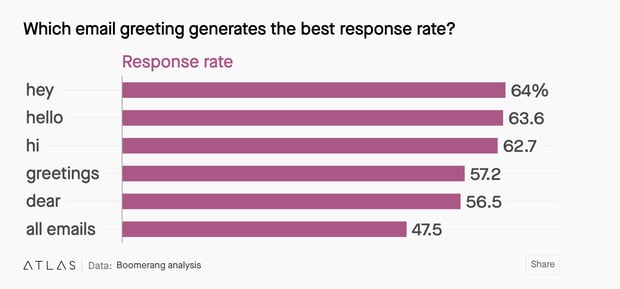A seemingly simple thing such as an email greeting can leave many job seekers paralyzed in confusion. How do I greet the prospective employer? Is “Hi” too informal? Should I go for “Dear Sir”, “To [Name]”, skip the formal email greetings part altogether? Let’s dig into the nitty-gritty!
How to Start an Email: a Quick Refresher
Your first email to a prospective employer can seem like a big deal. Indeed it is as it’s your first opportunity to introduce yourself.
But that doesn’t mean you should obsess over every letter and even more so about the opening line.
The goal of a business email opening paragraph is threefold:
- Briefly introduce yourself
- State the point of the email
- Provide an enticing opener to read further
In some cases, employers may also leave specific instructions for job application emails. For example, use the job reference number. Be sure to follow these! Or else your email may just get lost in the pile.
To give you some extra context, here are several email openings job seekers can use:
Example for email cover letter:
Hello [Name Surname],
My name is Carl Smith, and I’m applying for an Electrical Engineering Position (Reference #26593 with Eletrics LLC. I have 5+ years of experience in the field, of which 3 years were spent working on microchips circuits design — a competency you’ve mentioned as crucial for this role.
Example for recruiter outreach email:
Hi [Recruiter Name],
It’s Irene Mayers, we connected at a virtual marketers summit last Friday and I’m following up on our conversation regarding the Digital Marketing Manager role you are looking to fill in with Smartling Agency.
Example for job inquiry:
Hello [Company Name] HR Team,
On your website, I’ve noticed that you are actively hiring for events staff. Perhaps you are also looking for a bartender to assist you during the events. I’m currently employed part-time with Hilton Hotel and Svante Lounge, and looking for extra weekend shifts”.
Read even more tips on how to write a letter of interest for a job.
4 Formal Email Greetings To Use Instead of “To Whom It May Concern”
It’s no secret that the “To whom it may concern” email salutation is a pet peeve of most employers.
Why? Because it’s so painfully overused, impersonal, and plain boring that every other reader will involuntarily roll their eyes when seeing an email or cover letter starting with it.
Given that the last thing you’d want is to annoy your future boss, it’s best to opt for an email greeting. But which one will do the trick?
A group of researchers recently analyzed over 300,000 emails to determine which opening lines generate the best response. Here are the results:

Source: Quartz
Hello [Name Surname]
The simplest option is often the best as the above research indicates. Starting your business email to an employer or a recruiter with a “Hello [Name Surname]” is a tested and tried formula for success.
Just make sure you research the person’s full name in advance and spell it correctly. Usually, you can find the recruiters name:
- At the bottom on the job application form
- Via LinkedIn by looking at recruiters, associated with the job ad or company
- By browsing the company website directly
If you cannot locate the right person, drop the name part and merely open with “Hello” or “Hello HR Team”.
Greetings [Name Surname]
This email greeting is a halftone more formal than plain “Hello”. Thus you may want to go for this option if you are applying to a more traditional company with a more formal corporate culture. Think financial companies, educational institutions, legal firms.
Also, another body of research indicates that formality tends to be higher when the communicators have less shared context. Surely, this is likely the case between you and a prospective employer.
But highlighting this gap can play against you since the same research indicates that people tend to be more formal when they dislike each other. This isn’t ideal if you want to actually get that interview call-back! So perhaps you’d want to go for a less formal option.
Dear [Name Surname]
This is the most formal email greeting most of our teachers urged us to use in formal business communication. But the truth is most people today view “Dear” salutation in emails as quite old-fashioned and stuffy.
Also, using “Dear” can reveal your age (if you are an older person yourself). So if you are after 50 and looking for a job (and would rather avoid being discriminated against), it’s best to go for a more neutral option.
Perhaps the only case when “Dear Mr/Ms/Prof” is acceptable is if you are submitting an application to college or writing a cover letter for graduate school.
Overall, Will Schwalbe, co-author of “Send: Why People Email So Badly and How to Do It Better” book recommends avoiding “Dear” salutation.
And even more so ditch the following email greetings:
- ‘Dear friend…’
- ‘Dear [Job Title], … ‘
- ‘Dear Ma’am, … ‘
- ‘Dear Sir or Madam, … ‘
Hi [Name Surname]
“Hi” may not seem like the best first choice, but let’s keep it real: most employers today prefer a personalized, slightly less formal communication style. So start your letter with this simple two-word greeting is viewed as acceptable by most.
If you are not sure that this greeting is okay to use, do some background company research. Check their website, sign up for their newsletter. Check how they greet prospects and mirror the same tone of voice.
To Conclude
Don’t get overly concentrated on email greetings. It’s just one word in your cover letter. Instead, pay more attention to the opening paragraph and the content. Check our more detailed guide on how to start a cover letter for even more advice!






